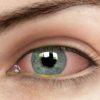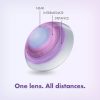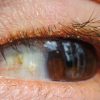WHAT IS A MACULAR HOLE?
The macular is the part of our eye that gives us clear, sharp, central vision used for driving, reading and seeing fine detail. A macular hole refers to a small break in the macular, which is found centrally on the retina.
WHAT CAUSES A MACULAR HOLE?
Macular holes often occur due to ageing and are most commonly seen in people over the age of 60. As we get older, the vitreous or jelly-like substance that fills about 80% of our eye to give our eye its shape becomes liquefied, which causes it to shrink and pull away from the retina. Normally, the vitreous pulls away from the retina with no problems. However, in some cases, the vitreous may be firmly attached to the retina when it pulls away, which causes the macular to stretch and a hole to form.
Macular holes can also occur due to other eye diseases or disorders, such as high myopia (nearsightedness), retinal detachment, eye injury or macular pucker (rare). Macular holes usually only affect one eye. However, there is a 10-15% chance that a macular hole will also develop in the other eye at some stage later in life.
WHAT ARE THE SYMPTOMS OF A MACULAR HOLE?
Macular holes cause our central vision to become wavy, distorted or blurred. Slightly distorted/wavy lines, blurred vision when looking straight or trouble reading small, fine print may be noticed in the early stages of a macular hole. This can then progress into a blank patch or ‘hole’ in the centre of vision in later stages.
There are three main stages to a macular hole, each defined by the size of the hole and the number of layers of the retina which are affected.
- Stage I: Foveal detachment
Without treatment, about half of Stage I macular holes will progress.
- Stage II: Partial-thickness holes
Without treatment, about 70% of Stage II macular holes will progress.
- Stage III: Full-thickness holes
This is important to know as a macular hole may heal without treatment in very early stages and as such, should be regularly monitored. However, in most cases, a macular hole will get larger. This is a vision-threatening condition that requires immediate attention and treatment to ensure that central vision is not lost.
WHAT IS THE DIFFERENCE BETWEEN A MACULAR HOLE AND AGE-RELATED MACULAR DEGENERATION?
Macular holes and age-related macular degeneration are two separate and distinct conditions, although the symptoms for both are similar and are common in people over the age of 60. A macular hole involves a break in the macular of our eye. AMD involves increased drusen deposits at the macular which negatively stimulate the bleeding of vessels.
If you are experiencing blurred or distorted vision when looking straight or have difficulty reading small print, please contact us on 9728 7288 for an eye examination to see one of our optometrists.






